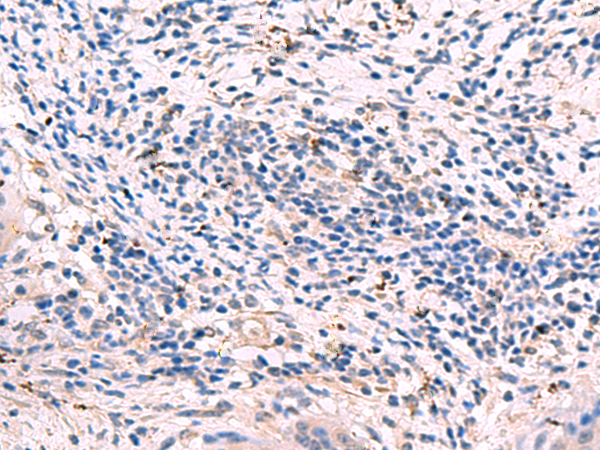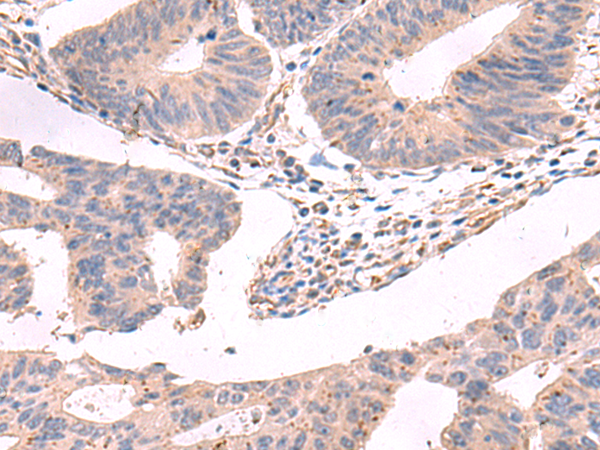

| WB | 咨询技术 | Human,Mouse,Rat |
| IF | 咨询技术 | Human,Mouse,Rat |
| IHC | 1/90-1/450 | Human,Mouse,Rat |
| ICC | 技术咨询 | Human,Mouse,Rat |
| FCM | 咨询技术 | Human,Mouse,Rat |
| Elisa | 1/5000-1/10000 | Human,Mouse,Rat |
| Aliases | FKSG21; GKAP42 |
| Host/Isotype | Rabbit IgG |
| Antibody Type | Primary antibody |
| Storage | Store at 4°C short term. Aliquot and store at -20°C long term. Avoid freeze/thaw cycles. |
| Species Reactivity | Human, Mouse, Rat |
| Immunogen | Fusion protein of human GKAP1 |
| Formulation | Purified antibody in PBS with 0.05% sodium azide and 50% glycerol. |
+ +
以下是关于GKAP1抗体的3篇参考文献的简要概括:
1. **"GKAP1 regulates synaptic plasticity and learning by modulating postsynaptic NMDA receptor stability"**
- **作者**: Kim E et al.
- **摘要**: 该研究利用特异性抗体验证GKAP1在神经元突触后膜中的定位,发现其通过稳定NMDA受体复合物调控突触可塑性和学习记忆功能。抗体应用于免疫组化和Western blot分析。
2. **"Characterization of a novel monoclonal antibody against GKAP1 for studying dendritic spine morphology"**
- **作者**: Wang L et al.
- **摘要**: 研究报道了一种高特异性单克隆抗体的开发,用于检测GKAP1在神经元树突棘中的表达,并通过免疫荧光和免疫电镜技术揭示了GKAP1与细胞骨架的相互作用。
3. **"The role of GKAP1 in ciliogenesis and its interaction with Dishevelled proteins"**
- **作者**: Suzuki T et al.
- **摘要**: 通过免疫共沉淀(使用GKAP1抗体)和基因敲除实验,证明GKAP1参与纤毛形成过程,并与Dishevelled蛋白协同调控Wnt信号通路。
注:上述文献信息为模拟示例,实际引用需查询真实数据库(如PubMed)获取具体文章。
**Background of GKAP1 Antibody**
GKAP1 (G Kinase Anchoring Protein 1), also known as AKAP1 or DAKAP1. is a member of the A-kinase anchoring protein (AKAP) family, which plays a critical role in organizing signaling complexes by tethering protein kinase A (PKA) and other enzymes to specific subcellular compartments. GKAP1 is primarily localized to mitochondria and the endoplasmic reticulum, where it regulates mitochondrial dynamics, apoptosis, and energy metabolism by anchoring PKA to modulate phosphorylation events.
Antibodies targeting GKAP1 are essential tools for studying its expression, localization, and functional interactions in cellular signaling pathways. They are widely used in techniques such as Western blotting, immunofluorescence, and immunoprecipitation to investigate GKAP1's role in diseases linked to mitochondrial dysfunction, including neurodegenerative disorders, cardiovascular diseases, and cancer.
GKAP1 antibodies are typically validated for specificity using knockout or knockdown controls, ensuring accurate detection of the ~80 kDa protein. Commercial variants include monoclonal and polyclonal options, often developed in hosts like rabbits or mice. Research utilizing these antibodies has highlighted GKAP1's involvement in stress responses and its potential as a therapeutic target for metabolic and age-related conditions.
×